| 31 August |
• yesterday • tomorrow |
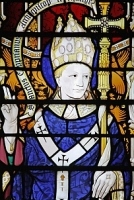
• Thaschus Caecilius Cyprianus
• Thascius Caecilius Cyprian
• 31 August in Eastern Church
• 26 September in the Anglican Church
Born to wealthy pagan parents. Taught rhetoric and literature. Adult convert in 246, taught the faith by Saint Caecilius of Carthage. Ordained in 247. Bishop of Carthage in 249. During the persecution of Decius, beginning in 250, Cyprian lived in hiding, covertly ministering to his flock; his enemies condemned him for being a coward and not standing up for his faith. As a writer he was second only in importance to Tertullian as a Latin Father of the Church. Friend of Saint Pontius. Involved in the great argument over whether apostates should be readmitted to the Church; Cyprian believed they should, but under stringent conditions. Supported Pope Saint Cornelius against the anti-pope Novatian. During the persecutions of Valerian he was exiled to Curubis in 257, brought back Carthage, and then martyred in 258. His name is in the Communicantes in the Canon of the Mass.
190 in Carthage, North Africa
beheaded 14 September 258 in Carthage, North Africa
• Algeria (proclaimed on 6 July 1914 by Pope Pius X)
• North Africa (proclaimed on 6 July 1914 by Pope Pius X, on 10 January 1958 by Pope Pius XII, and on 27 July 1962 by Pope John XXIII; editor's note - no, I don't know why it was done so many times)
You cannot have God for your Father if you do not have the Church for your mother.... God is one and Christ is one, and his Church is one; one is the faith, and one is the people cemented together by harmony into the strong unity of a body.... If we are the heirs of Christ, let us abide in the peace of Christ; if we are the sons of God, let us be lovers of peace. - Saint Cyprian, from The Unity of the Catholic Church
Whatever a man prefers to God, that he makes a god to himself. - Saint Cyprian
Let us remember one another in concord and unanimity. Let us on both sides of death always pray for one another. Let us relieve burdens and afflictions by mutual love, that if one of us, by the swiftness of divine condescension, shall go hence the first, our love may continue in the presence of the Lord, and our prayers for our brethren and sisters not cease in the presence of the Father's mercy. - Saint Cyprian from Letters, 253
On the morning of the 14th of September, a great crowd gathered at the Villa Sexti, in accordance with the order of the governor Galerius Maximus. That same day the governor commanded Bishop Cyprian to be brought before him for trial. After Cyprian was brought in, the governor asked him, "Are you Thascius Cyprian?" The bishop replied, "Yes, I am." The governor Galerius Maximus said, "You have set yourself up as an enemy of the gods of Rome and our religious practices. You have been discovered as the author and leader of these heinous crimes, and will consequently be held forth as an example for all those who have followed you in your crime. By your blood the law shall be confirmed." Next he read the sentence from a tablet. "It is decided that Cyprian should die by the sword." Cyprian responded, "Thanks be to God!" After the sentence was passed, a crowd of his fellow Christians said, "We should also be killed with him!" There arose an uproar among the Christians, and a great mob followed after him. Cyrprian was then brought out to the grounds of the Villa Sexti, where, taking off his outer cloak and kneeling on the ground, he fell before the Lord in prayer. He removed his dalmatic and gave it to the deacons, and then stood erect while waiting for the executioner. When the executioner arrived, Cyprian told his friends to give the man 25 gold pieces. The most Blessed martyr Cyprian suffered on the 14th of September under the emperors Valerian and Gallienus, in the reign of our true Lord Jesus Christ, to whom belong honor and glory for ever. Amen. - from the Acts of the Martyrdom of Saint Cyprian by Saint Pontius
You who are envious, let me tell you that however often you may seek for the opportunity of injuring him whom you hate, you will never be able to do him so much harm as you do harm to yourselves. He whom you would punish through the malice of your envy, may probably escape, but you will never be able to fly from yourselves. Wherever you may be your adversary is with you, your sin rankles within. It must be a self-willed evil to persecute a person whom God has taken under the protection of His grace; it becomes an irremedial sin to hate a man whom God wishes to make happy. Envy is as prolific as it is hurtful; it is the root of all evil, the source of endless disorder and misery, the cause of most sins that are committed. Envy gives birth to hatred and animosity. From it avarice is begotten, for it sees with an evil eye honors and emoluments heaped upon a stranger, and thinks that such honors should have been, by right, bestowed upon himself. From envy comes contempt of God, and of the salutary precepts of our Savior. The envious man is cruel, proud, unfaithful, impatient, and quarrelsome; and, what is strange, when this vice gains the mastery, he is no longer master of himself, and he is unable to correct his many faults. If the bond of peace is broken, if the rights of fraternal charity are violated, if truth is altered or disguised, it is often envy that hurries him on to crime. What happiness can such a man enjoy in this world? To be envious or jealous of another, because such a one is virtuous and happy, is to hate in him the graces and blessings God has showered down upon him. Does he not punish himself when he sees the success and welfare of others? Does he not draw down upon himself tortures from which there is no respite? Are not his thoughts, his mind, constantly on the rack? He pitilessly punishes himself, and, in his heart, performs the same cruel office which Divine Justice reserves for the chastisement of the greatest criminal. - Saint Cyprian
https://catholicsaints.info/saint-cyprian-of-carthage/
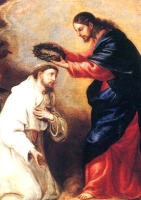
• Raymund Nonnatus
• Raimundo Nonato
Born to the Spanish nobility. Well educated, his father planned a career for Raymond in the royal court in Aragon (part of modern Spain). When Raymond felt drawn to religious life, his father ordered him to manage one of the family farms. However, Raymond spent his time with the shepherds and workers, studying and praying until his father gave up the idea of making his son a wordly success.
Mercedarian priest, receiving the habit from Saint Peter Nolasco, the order's founder. Master-general of Mercedarian Order. Spent his entire estate ransoming Christians from Muslim captors, then surrendered himself as a hostage to free another. Sentenced to death by impalement, he was spared because of his large ransom value. Imprisoned and tortured, he still managed to convert some of his guards. To keep him from preaching the faith, his captors bored a hole through his lips with a hot iron, and attached padlock. Raymund was eventually ransomed, returning to Barcelona, Spain in 1239.
Created cardinal by Pope Gregory IX, Raymond continued to live as a mendicant monk. He died while en route to Rome to answer a papal summons.
• 1204 at Portella, diocese of Urgel, Catalonia, Spain
• delivered by caesarean operation (c-section) when his mother died in childbirth; hence the name non natus = not born
• 31 August 1240 at Cardona, Spain of a fever
• buried at the chapel of Saint Nicholas near his family farm he was supposed to have managed
5 November 1625 by Pope Urban VIII (cultus confirmed)
1657 by Pope Alexander VII (canonized)
• against fever
• babies, infants, newborns
• childbirth
• children
• expectant mothers, pregnant women
• falsely accused people
• midwives
• obstetricians
• Baltoa, Dominican Republic
• San Ramon, Costa Rica
• Mercedarian surrounded by Moors and prisoners
• Mercedarian surrounded by ransomed slaves
• Mercedarian with a cardinal's red hat
• Mercedarian with a padlock on his lips
https://catholicsaints.info/saint-raymond-nonnatus/
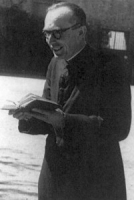
The son of Francesco and Carmen Tarrés i Claret, he and his sisters Francesca and Maria, both of whom became Conceptionist nuns, were raised in a Christian home. Due to his father‘s work as a mechanic, the family moved regularly. He received Confirmation on 31 May 1910, and his first Communion on 1 May 1913. Pere was educated by the Piarist Fathers and Jesuits, helped in a local pharmacy, and graduated from the College of Saint Ignatius. He studied medicine at the University of Barcelona, and attended the Oratory of Saint Philip Neri. Member of the Federation of Young Christians and Catholic Action. Pere’s father died in July 1925, and not long after his mother was in an accident that left her crippled for life. Received his degree in medicine in 1928. With Dr Gerardo Manresa, he founded the Our Lady of Mercy clinic in Barcelona which concentrated on treating tuberculosis patients.
Pere was on a spiritual retreat at the Montserrat monastery when the Spanish Civil War broke out and its anti–Christian persecutions began. He continued working at the clinic, and secretly bringing Communion to covert Catholics. Drafted by the Spanish Republic in July 1938 to serve as an army doctor, receiving the rank of captain. Along with treating patients, he studied Latin and philosophy, and after the war he taught at the University of Barcelona. He entered Barcelona seminary on 29 September 1939, and was ordained a priest in the archdiocese of Barcelona on 30 May 1943. Studied theology at the Pontifical University in Salamanca, Spain, receiving his degree on 13 November 1944. Served as an official in Catholic Action, was active in parish youth ministry, and as chaplain of women‘s religious houses, including the Franciscan Sisters of the Sacred Heart. Taught moral theology and served as confessor at the seminary in Barcelona.
Father Pere was diagnosed in May 1950 with an aggressive form of cancer. His health went rapidly downhill, and he offered his final months of suffering and death for the sanctification of his brother priests.
30 May 1905 in Manresa, Barcelona, Spain
• 31 August 1950 in his clinic in Barcelona, Spain of lymphoblastic lymphosarcoma
• buried in the Montjuic cemetery
• re-interred in the parish church of San Vicente of Sarrià on 6 November 1975
5 September 2004 by Pope John Paul II in Loreto, Italy
https://catholicsaints.info/blessed-pere-tarres-i-claret/
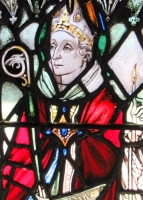
• Apostle of Northumbria
• Aedan of Lindisfarne
Monk at Iona, Scotland. Studied under Saint Senan at Inish Cathay. Bishop of Clogher, Ireland. Resigned the see to became a monk at Iona c.630. Evangelizing bishop in Northumbria, England at the behest of his friend the king, Saint Oswald of Northumbria. Once when pagans attacked Oswald's forces at Bambrough, they piled wood around the city walls to burn it; Saint Aidan prayed for help, and a change in wind blew the smoke and flames over the pagan army.
Aidan was known for his knowledge of the Bible, his eloquent preaching, his personal holiness, simple life, scholarship, and charity. Miracle worker. Trained Saint Boswell. Founded the Lindesfarne monastery that became not only a religious standard bearer, but a great storehouse of European literature and learning during the dark ages. Saint Bede is lavish in his praise of the episcopal rule of Aidan.
Irish
• 31 August 651 at Bamburg, England of natural causes
• the young Saint Cuthbert of Lindisfarne, a shepherd in the fields at the time, saw Aidan's soul rise to heaven as a shaft of light
• buried at Lindesfarne
• calming a storm
• extinguishing a fire
• holding up a lighted torch
• with a stag at his feet
O holy Bishop Aidan, Apostle of the North and light of the Celtic Church, glorious in humility, noble in poverty, zealous monk and loving missionary, intercede for us sinners that Christ our God may have mercy on our souls. - troparion of Saint Aidan
Thou didst teach and preserve Christ's doctrine and didst spread the faith throughout Northumbria, O holy Hierarch Aidan. Unceasingly pray to God for us for thou dost worship before His throne for ever. - kontakion of Saint Aidan
https://catholicsaints.info/saint-aidan-of-lindesfarne/
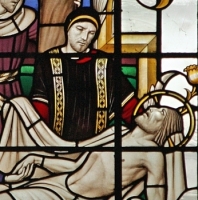
Joseph of Glastonbury
16 October (translation of relics to Jerusalem)
Wealthy Israelite owner of tin mines in Cornwall. May have been related to Jesus, and certainly was a disciple and student. He is the noble counselor mentioned in the Gospel of Mark. Provided the tomb for Christ, and with the help of Saint Nicodemus, interred Jesus. Tradition says he brought the Faith and the Holy Grail to England. When he planted his traveller's staff in Glastonbury, it took root and became a thorn tree which flowered each Christmas Day.
Arimathea, Palestine
1st century
• coffin-bearers, pallbearers
• funeral directors, morticians, undertakers
• tin miners
• tin smiths
• Catholic Cemeteries of the Archdiocese of Vancouver
• Glastonbury cathedral
Merciful God, whose servant Joseph of Arimathaea with reverence and godly fear, prepared the body of our Lord and Savior for burial, and laid it in his own tomb: Grant to us, your faithful people, grace and courage to love and serve Jesus with sincere devotion all the days of our life; through Jesus Christ our Lord, who lives and reigns with you and the Holy Spirit, one God, for ever and ever.
• very old man carrying a pot of ointment
• very old man carrying a flowering staff
• very old man carrying a pair of altar cruets
• flowering staff
https://catholicsaints.info/saint-joseph-of-arimathea/
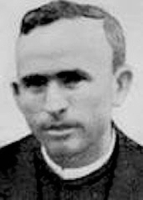
Member of the Salesians, making his novitiate in Carabanchel Alto, Spain, and making his religious profession in 1918. He studied philosophy and education in Carabanchel Alto, Barcelona and Baracaldo. Teacher in Havana, Cuba in work that substituted for mandatory military service. Ordained a priest in 1927, and assigned to Carabanchel Alto for six years. He also worked in the Spanish cities of Bilbao and Madrid. Served as teacher, counselor, catechist and spiritual director at the San Miguel Arcángel School on the Paseo de Extremadura in 1933 till 1936; remembered by former students for his deep spiritual life, his strict personal adherance to Salesian principles, and as a counselor who could reach them on their own level in spiritual and academic matters. At the outbreak of the Spanish Civil War, Father Germán and the other Salesians were forced to abandon the school and go into hiding. Seized at a boarding house in Madrid on 30 August 1936 and executed the next day for the crime of being a priest.
9 February 1899 in San Cristobál de Priero, Oviedo, Spain
shot in the early morning hours of 31 August 1936 in the cemetery Aravaca, Madrid, Spain
28 October 2007 by Pope Benedict XVI
https://catholicsaints.info/blessed-german-martin-y-martin/
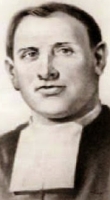
Edmigio, Edmigius
16 November as one of the Martyrs of Almeria
Member of the Brothers of the Christian Schools (De La Salle Brothers); he entered the novitiate on 3 August 1898, taking the name Edmigio; he received the habit on 8 October 1898, and his perpetual vows on 11 August 1911. Taught in several schools and in Saint Joseph College in Almería, Spain. Arrested by the anti-Catholic Popular Front forces in the Spanish Civil War, and executed for the crime of teaching Christianity. One of the Martyrs of Almeria killed during the Spanish Civil War.
4 April 1881 in Adalia, Palencia, Spain
• shot in the head on 31 August 1936 in Pozo de la Lagarta, Tabernas, Almería, Spain
• body thrown into a well
10 October 1993 by Pope John Paul II
https://catholicsaints.info/blessed-isidoro-primo-rodriguez/
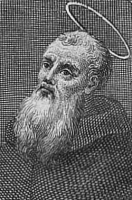
Andrea Dotti
Born to the nobility, the brother of Count Dotto Dotti. A career soldier, he rose to the rank of captain of archers in the army of Philippe the Fair. Though he grew up a courtier and lived as a soldiers, Andrew was always drawn to religious life. In 1278, after hearing a sermon by Saint Philip Benizi, he joined the Servite Order, being received into the Order by Saint Philip himself. Priest. Held several offices in the Order. Noted preacher and sought after confessor. Known in his day for his personal penances. Visionary and miracle worker. Late in life he retired to Montevecchio to spend his final days in prayer and solitude.
1256 at Borgo San Sepolcro, Tuscany, Italy
• 31 August 1315 in Montevecchio, Italy of natural causes
• buried in Borgo San Sepolcro, Tuscany, Italy
29 November 1806 by Pope Pius VII (cultus confirmed)
https://catholicsaints.info/blessed-andrew-dotti/
Eustaquio of Villaquite
Feeling an early call to religious life, Bernardo joined the Capuchins on 20 May 1920, aged 17, taking the name Eustaquio de Villaquite; he made his profession as a lay brother on 6 May 1921. When the Spanish Civil War broke out in 1936, Bernardo was serving as a cook in the Capuchin house in Gijón, Spain. For the offense of being in religious life, he was arrested by militiamen on 21 July 1936; witnesses attest that he spent all his time in prayer. He was used as forced labour, including clearing debris from bomb sites, and repeatedly ordered to renounce his faith; Brother Bernardo refused. Martyr.
20 August 1903 in Villaquite, León, Spain
shot in the early morning of 31 August 1936 in Gijón, Asturias, Spain
13 October 2013 by Pope Francis
https://catholicsaints.info/blessed-bernardo-cembranos-nistal/
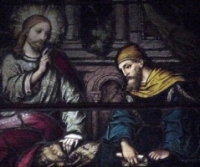
Member of the Sanhedrin in Israel during the life of Jesus. He was a secret disciple of Christ, meeting him by night to avoid the wrath of the other members of the Sanhedrin, and eventually spoke out to that body to remind them that Jesus had a right to a hearing. With Saint Joseph of Arimathea he prepared Jesus' body and placed him in the tomb. There was an apocryphal "gospel" that was purported to have been written by him; it is sometimes entitled the Acts of Pilate. Tradition says he was a martyr, though no details have survived.
1st century
https://catholicsaints.info/saint-nicodemus/
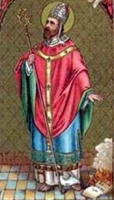
Missionary to Germany where he worked with Saint Maximinus in the area of Trier. Bishop of Trier in 349. Strongly supported Saint Athanasius of Alexandria, which led to him being exiled to Phrygia, Asia Minor by the Arian Emperor Constantius in 355; he was never able to return to his diocese; he died in exile, and thus is considered a martyr.
Gascony, France
• 358 in Phrygia, Asia Minor (in modern Turkey)
• relics returned to Trier, Germany in 396
https://catholicsaints.info/saint-paulinus-of-trier/
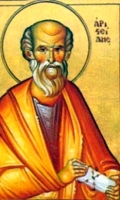
• Aristides of Athens
• Aristide Marciano
Early Christian writer and philosopher. Taught philosophy in Athens, Greece. Presented an explanation of Christianity to Emperor Hadrian in 133, a work inspired by the persecution of Christians, and which led to an imperial decree that paused the imperial anti–Christian policy. Wrote an account of the Passion of Saint Dionysius the Areopagite.
https://catholicsaints.info/saint-aristides-the-philosopher/
Pádraig Ó Héilí
20 June as one of the Irish Martyrs
Franciscan Friars Minor (Observants) priest. Chosen bishop of Mayo, Ireland in 1576 by Pope Gregory XIII. Martyr.
in Dromahaire, Leitrim, Ireland
31 August 1579 in Kilmallock, Limerick, Ireland
27 September 1992 by Pope John Paul II in Rome, Italy
https://catholicsaints.info/blessed-patrick-ohealy/
Cuthburg, Cuthburga
Sister of King Ina of Wessex in England; sister of Saint Cwenburgh of Wimborne. Benedictine nun at Barking Abbey in Essex, England where she was a friend of Saint Hildelith. With Cwenburgh, she founded a monastery in Wimborne, Dorset, England, and served as abbess there. Many of her Wimborne sisters worked as missionaries to Germany.
c.725
https://catholicsaints.info/saint-cuthburgh-of-wimborne/
Conn, Connus, Cornelius
20 June as one of the Irish Martyrs
Franciscan Friars Minor (Observants) priest. Martyr.
c.1549 in Breifne (now in counties Leitrim and Cavan), Ireland
31 August 1579 in Kilmallock, Limerick, Ireland
27 September 1992 by Pope John Paul II in Rome, Italy
https://catholicsaints.info/blessed-conn-orourke/
Cesidio
Son of Saint Rufinus. Priest. Imprisoned, tortured and martyred in the persecutions of Maximinus with several fellow Christians, including Saint Placidus and Saint Eutychius, but most of whose names have not come down to us. While in prison, he ministered to other prisoners, and converted some who were pagans.
3rd century on the shores of Lake Fucino near Rome, Italy
https://catholicsaints.info/saint-caesidius/
Sister of King Ina of Wessex in England; sister of Saint Cuthburgh of Wimborne. Benedictine nun. With Cuthburgh, she founded a monastery in Wimborne, Dorset, England, and served as abbess there. Many of her Wimborne sisters worked as missionaries to Germany.
https://catholicsaints.info/saint-cwenburgh-of-wimborne/
Married to Saint Rufina of Caesarea. Father of Saint Mamas. Martyred in the persecutions of Aurelian.
c.270 at Caesarea, Cappadocia, Asia Minor
https://catholicsaints.info/saint-theodotus-of-caesarea/
Married to Saint Theodotus of Caesarea. Mother of Saint Mamas. Martyred in the persecutions of Aurelian.
c.270 at Caesarea, Cappadocia, Asia Minor
https://catholicsaints.info/saint-rufina-of-caesarea/
Foster-mother of Saint Mamas. Martyred in the persecutions of Aurelian.
c.270 at Caesarea, Cappadocia, Asia Minor
https://catholicsaints.info/saint-ammi-of-caesarea/
Bishop of Auxerre, France c.529.
c.530 of natural causes
https://catholicsaints.info/saint-optatus-of-auxerre/
Abbot in Bobbio, Italy.
c.640
https://catholicsaints.info/saint-barbolenus-of-bobbio/
Early martyr.
in Milan, Italy
https://catholicsaints.info/saint-robustian-of-milan/
Early martyr.
in Milan, Italy
https://catholicsaints.info/saint-mark-of-milan/
Thousands of people were murdered in the anti-Catholic persecutions of the Spanish Civil War from 1934 to 1939. I have pages on each of them, but in most cases I have only found very minimal information. They are available on the CatholicSaints.Info site through these links:
• Blessed Bernardo Cembranos Nistal
• Blessed Dionisio Ullivarri Barajuán
• Blessed Enrique Vidaurreta Palma
• Blessed Félix Paco Escartín
• Blessed Isidro Ordóñez Díez
• Blessed José María Palacio Montes
• Blessed Justo Zariquiegui Mendoza
• Blessed Marciano Herrero Martínez
• Blessed Miguel Menéndez García
• Blessed Tomás Alonso Sanjuán
• Blessed Ventureta Sauleda Paulís
• Martyrs of Pozo de la Lagarta
• Martyrs of Prague
• Agylus of Orléans
• Coemed Maccu Baird
• Enswida of Folkestone
• Evergislus of Meaux
• Martin Gotsfrucht
• Maurentius of Fossombrone
• Wala of Corbie
• Waldef of Croyland
CatholicSaints.Info Portable Edition